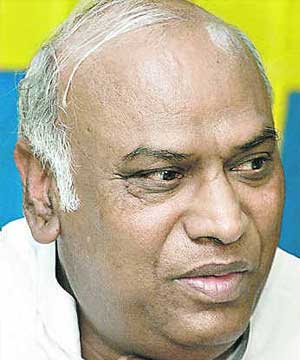God a traffic rule for Kharge
 Union Minister Mallikarjun Kharge visits temples but does not worship. He pays obeisance but does not wish. God, he says, is like a traffic rule: violate and you suffer, follow and it’s smooth sailing. Praying, however, will not work wonders. What will is hard work. His take: “Unless your hands gets soiled you will not get sweets in your mouth”. Read: Reap the benefits of hard work.
Union Minister Mallikarjun Kharge visits temples but does not worship. He pays obeisance but does not wish. God, he says, is like a traffic rule: violate and you suffer, follow and it’s smooth sailing. Praying, however, will not work wonders. What will is hard work. His take: “Unless your hands gets soiled you will not get sweets in your mouth”. Read: Reap the benefits of hard work.
A follower of Buddhism, Kharge claims to have fought blind faith and orthodoxy. He grew up amid people who invoked spirits and performed animal sacrifices. He led a group of young kids in a door-to-door campaign to fight this and untouchability.
Though from a Scheduled Caste, Kharge, the son of a textile mill worker, said he faced no bias. “I lived in an urban area and therefore did not experience any discrimination. I fought it for others who did,” he said.
Kharge studied in a school run by a Brahmin association. “I was good in studies and my father paid full fees: Re 1 per month for class 1, Rs 2 for class 2 and up to Rs 10 in class 10. So, we were treated as equals,” he said.
Yet he was in the forefront to defy the ban against the lower castes entering temples or being made to draw drinking water from separate wells.
For someone who belongs to a southern state (Karnataka), Kharge speaks fluent Hindi and Urdu. As a student of law, Kharge dabbled in trade unionism but was clear that he would pursue politics and not law. He began by organising an employees union in the Gulbarga district of Karnataka and joined the Congress as early as in 1969.
He is among the few politicians to have never ever lost an election. He not only made it as an MP but was also sworn in as Cabinet minister the first time he made it to the Lok Sabha. Of course, he has served in various capacities in his home state, Karnataka both as minister and Congress chief. Had the BJP not won the state elections the last time, Kharge was in the reckoning for chief ministership.
But he was criticised for faulty distribution of tickets. “There were allegations of tickets being sold and the rich benefiting. It was Kharge’s misfortune that the election was mishandled and as PCC chief he was blamed for the debacle, ” said former state minister M. Raghupati.
A bitter experience is how Kharge sees the post-2008 phase: “Friends turned foes. Merit lost to caste. One is misjudged despite putting in years of hard work.”
Kharge is still seen as one whose influence is limited to his constituency. His negative as a minister and party chief in the state was that he was neither accessible nor popular with the people or
Congress rank and file. But state minister K Srinivasa Gowda contests this: “He has no negatives and is a very, very good man –of a helpful nature and pro-poor”.